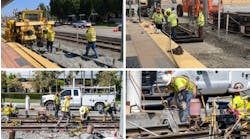San Francisco Infrastructure and Cable Car Maintenance Projects Completed
Mayor Edwin M. Lee today joined the San Francisco Municipal Transportation Agency (SFMTA), which oversees all surface transportation in the city, including the Municipal Railway (Muni), along with the San Francisco Department of Public Works (DPW) and the San Francisco Public Utilities Commission (SFPUC) to announce the completion of two cable car system and city infrastructure improvement projects that required the six-month shutdown of the California Cable Car Line as well as three separate five-day shutdowns of the Powell-Mason and Powell-Hyde Cable Car Lines.
“Today, we celebrate the reopening of the historic California Cable Car Line, an important and iconic mode of transportation in San Francisco. Investments in our infrastructure, such as this, not only keeps San Franciscans working, but it is necessary to keep the city moving.” said Mayor Lee. “The reopening of the California cable car line ensures that our city will continue to be a world class travel destination."
“The care and stewardship of the cable cars, a National Historic Landmark, are a vital part of our capital improvement program,” said Nathaniel P. Ford Sr., SFMTA executive director/CEO. “As we continue to reinvest in Muni, we invest in the future of San Francisco.”
“As stewards of the public right of way, this investment in our infrastructure ensures that our streets are safe and reliable,” said Edward Reiskin, DPW director. “This coordinated approach helps to minimize inconvenience and disruption to residents over the long term.”
California Street Infrastructure Improvement Project
The California Street Infrastructure Improvement Project that led to improvements on the 17 blocks of California Street between Drumm Street and Van Ness Avenue is the result of years of planning and coordination between City agencies.
“It’s always more cost-effective and less disruptive to coordinate infrastructure projects,” said SFPUC general manager Ed Harrington. “This multi-agency project is a great example of how the city coordinates different street, transit and utility improvements to minimize any potential impacts.”
During the California Street Infrastructure Improvement Project, the SFMTA, DPW and SFPUC:
- Replaced necessary electrical and mechanical components to support the safe operation of the cable car system (i.e. conduits, pulley brackets, switches)
- Reconstructed concrete streets
- Repaved street
- Performed construction and installation of curb ramps at every intersection (excluding Van Ness Avenue and Stockton and Sabin streets) to comply with the Americans with Disability Act requirements
- Repaired sidewalk curbs
- Replaced sewer
The project was implemented in two phases. The first phase of construction began last September. The second phase, which included the six-month shutdown of the California Cable Car Line, started Jan. 3. Substantial completion of major construction and the return of cable car service on California Street began on June 21.
The SFMTA, DPW and SFPUC collaborated on the $24 million California Street Infrastructure Improvement Project. The total cost of the project was divided between the cable car line maintenance and improvements ($19 million), resurfacing streets and constructing curb ramps ($3.5 million) and the repair and replacement of sewers ($1 million).
Cable Car Improvement Project
The $12 million Powell Cable Car Improvement Project was narrower in scope than the California line project. During three separate shutdowns of portions of the Powell-Hyde and Powell-Mason Lines, the SFMTA replaced the propulsion systems on the cable car lines and the control console in the Cable Car Barn at Washington and Mason streets.
Upgrading these systems from analog to digital will provide modern benefits to the systems that propel the cable cars and that communicate monitoring information about the cables on these lines back to the Cable Car Barn.
During the cable car shutdowns on the California and the Powell cable car lines, Muni buses operated by Cable Car Operators were deployed to provide service on the lines, which have an average weekday ridership of more than 22,000. Prior to the shutdowns, Operators provided customers notices in coordination with a coordinated multilingual multimedia customer information campaign. Because of the sporadic schedule of shutdowns on the Powell lines, SFMTA Ambassadors from throughout the Agency, including Cable Car Operators, were deployed to key locations to inform customers and assist with travel plans during the first days of each shutdown.
Outreach to the surrounding businesses and residents began in 2009. It was supported by regular e-mail and phone updates from project staff, street teams distributing reminders in the neighborhoods and responsive follow-up by SFMTA, DPW and SFPUC outreach teams as well as project staff during construction.
The businesses and neighborhoods surrounding the cable car lines were very supportive of the projects. The coordination with businesses such as Ghirardelli Square, the Masonic Auditorium, hotels from the Hyatt to the Huntington and the business improvement districts for both Fisherman’s Wharf and Union Square made this important effort proceed as smoothly and as quickly as possible.
The last major overhaul of the cable car system on California Street was completed in 1984. As a result, much of the system’s infrastructure, including key electrical and mechanical components, was worn and in need of rehabilitation. The roadway along the California Street corridor was last resurfaced 25 years ago.

